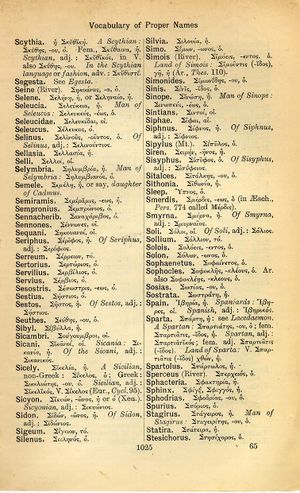Sidon
χλανίσι δὲ δὴ φαναῖσι περιπεπεµµένοι καὶ µαστίχην τρώγοντες, ὄζοντες µύρου. τὸ δ’ ὅλον οὐκ ἐπίσταµαι ἐγὼ ψιθυρίζειν, οὐδὲ κατακεκλασµένος πλάγιον ποιήσας τὸν τράχηλον περιπατεῖν, ὥσπερ ἑτέρους ὁρῶ κιναίδους ἐνθάδε πολλοὺς ἐν ἄστει καὶ πεπιττοκοπηµένους → Dressed up in bright clean fine cloaks and nibbling pine-thistle, smelling of myrrh. But I do not at all know how to whisper, nor how to be enervated, and make my neck go back and forth, just as I see many others, kinaidoi, here in the city, do, and waxed with pitch-plasters.
English > Greek (Woodhouse)
Σιδών, -ῶνος, ἡ.
Of Sidon, adj.: Σιδώνιος.
Latin > English (Lewis & Short)
Sīdon: ō̆nis (usu. ō, as in Greek; but in the derivatives
I common. A later collat. form Sīdōnĭa, ae, Just. 11, 10, 8; cf.: Babylonia, Lacedaemonia, etc.), f, = Σιδών, ῶνος and όνος, Heb. and Phoen. a very ancient and celebrated Phœnician city, the mother-city of Tyre, now Saida, Mel. 1, 12, 2; Plin. 5, 19, 17, § 76; Just. 18, 3, 4; Cic. Att. 9, 9, 2; Luc. 3, 217 al.; abl. Sidone, Lucr. 6, 585; Ov. M. 4, 571; cf. acc. Sīdōna Verg A. 1, 619; abl. Sīdŏne, Sil. 8, 438.—Hence,
A Sīdŏ̄nĭus, a, um, adj.
1 Of or belonging to Sidon, Sidonian: urbs, i. e. Sidon, Verg. A. 4, 545; cf. moenia, Ov. P. 1, 3, 77: amor, i. e. Jupiter's for Europa (of Sidon), Mart. 7, 32.—
2 Poet., Phœnician: raptus, i. e. of Europa, Stat. Th. 1, 5: rates, Ov. Tr. 4, 3, 2: hospes, i. e. Cadmus, id. M. 3, 129: Dido, Verg. A. 11, 74: nautae, Hor. Epod. 16, 59: murex, Tib. 3, 3, 18; cf. ostrum, Hor. Ep. 1, 10, 26; so, vestis, Prop. 2, 16 (3, 8), 55: chlamys, Verg. A. 4, 137: palla, Prop. 4 (5), 9, 47: mitra, id. 2, 29 (3, 27), 15 et saep.—
3 Carthaginian: duces, Sil. 1, 10: miles, id. 17, 213: cuspis, id. 5, 474.—
4 Because Thebes, in Bœotia, was said to have been founded by Cadmus, Theban: Sidoniae comites, i. e. Ismenides, Ov. M. 4, 542: turres, Stat. Th. 7, 443.—Subst plur.: Sīdō̆nĭi, ōrum, m., the Sidonians, Sall. J. 78, 1; and poet., Phœnicians, Ov. F. 3, 108.—*
B Sīdōnĭ-cus, a, um, adj., of or belonging to Sidon, Sidonian, Sall. J. 78, 4.—
C Sīdō̆nis, ĭdis, adj. f., Sidonian; poet., Phœnician: tellus, i. e. Phœnicia, Ov. M. 2, 840: concha, i. e. purple, id. ib. 10, 267.—More freq. subst., a Sidonian or Phœnician woman; of Europa, Ov. A. A. 3, 252; id. F. 5, 610; 5, 617; Stat. Th. 9, 334.—Of Dido, Ov. M. 14, 80.—Of Anna, Ov. F. 3, 649; Sil. 8, 70: Sīdōnĭda, id. 8, 194.
Latin > French (Gaffiot 2016)
(1) Sīdōn, ōnis, m., fils aîné de Chanaan, qui fonda Sidon : Bibl. ; Isid. Orig. 9, 2, 22 || v. Sidon 2.
(2) Sīdōn,¹⁴ ōnis et ŏnis, f. (Σιδών), Sidon [ville de Phénicie] ; par ext.] Tyr : Cic. Att. 9, 9, 2 ; Plin. 5, 76 ; Virg. En. 1, 619 ; Sil. 8, 438.

